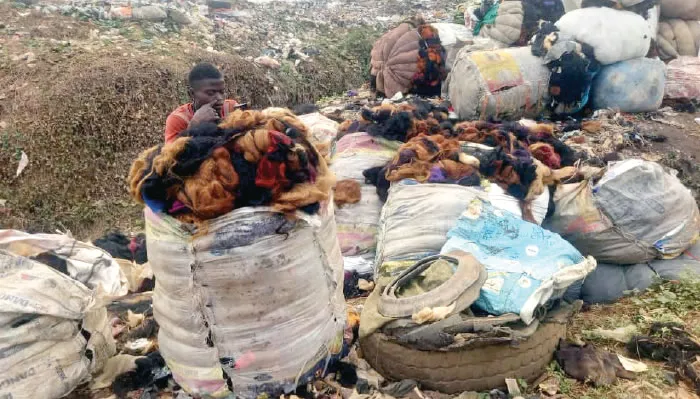In Lagos, Nigeria’s most populous city and a major economic hub in West Africa, nothing is considered waste in the hands of those who know how to repurpose it. Amid ongoing economic challenges, resourceful scavengers find opportunity in discarded items, with wigs being a surprisingly lucrative commodity. Despite the significant health risks, these scavengers are capitalizing on the market for secondhand wigs found in the city’s dumpsites.
Lagos generates an estimated 5.46 million tonnes of waste annually, much of which eventually finds its way back to the market, according to investigations by PUNCH Healthwise. Among the vast array of discarded goods are used wigs, which scavengers carefully sort through at various dumpsites.
Our correspondent visited three major dumpsites in Lagos—Olusosun in Ojota, Ikorodu’s Dumping site in Ewu-Elepe, and Solous in Igando—to observe the process. At these locations, used wigs are collected, repackaged, and sent to new markets, predominantly in northern Nigeria, where they are resold.
The Unseen Market for Scavenged Wigs
At the heart of Ikorodu’s Dumping site, where refuse piles up and the air is thick with decay, a market has flourished. Scavengers, many of whom have set up makeshift businesses amidst the waste, sort through metal scraps, old appliances, and tattered clothing. Among the more unusual finds are discarded wigs, often tangled and matted, which are carefully sorted by the scavengers.
One young man, who declined to be named, explained that while the market for used wigs in Lagos is underdeveloped, it thrives in the north. “It is being packed for onward transportation to the north. We send it there, and it sells out quickly,” he said, emphasizing that wigs, although undervalued in Lagos, are highly sought after in northern Nigeria.
When asked about the specific use of these wigs in the north, the man nonchalantly responded, “Na woman dey use am nah. They buy and wear it,” in casual Pidgin English.
A Growing Health Concern
While these secondhand wigs are often sold for a fraction of the price of new ones, they come with hidden health risks. Shoppers, unaware of their origins, often find themselves drawn to the wigs’ appealing texture, only to unknowingly expose themselves to harmful bacteria, fungi, and parasites.
According to dermatologists, the risks associated with wearing wigs scavenged from dumpsites are significant. Dr. Roli Madubuko, a consultant dermatologist and Associate Professor at the University of Benin, warned that these wigs can harbor harmful fungi and bacteria, leading to conditions such as ringworm (Tinea capitis), scalp boils (folliculitis), and impetigo. Additionally, the wigs may contain head lice and mites, which can persist for weeks without human contact.
“These wigs may also carry chemicals used in their treatment or dyeing, which can irritate the skin, leading to contact dermatitis,” Dr. Madubuko explained. She further warned that improperly fitting wigs could cause friction, irritation, and even hair loss, while tight wigs could obstruct blood flow to the scalp, leading to long-term damage.
Dr. Nkiruka Onodugo, a consultant dermatologist at the University of Nigeria Teaching Hospital in Enugu, echoed these concerns. She emphasized that the practice of wearing wigs from questionable sources can lead to serious health complications, and advised caution when purchasing wigs, urging women to be wary of such potentially hazardous items.
The Local Economy: A Profitable Yet Dangerous Trade
Despite the health risks, the trade in used wigs from Lagos dumpsites continues to thrive, particularly in the north. A food vendor at the Ikorodu dump, known as “Iya Tinubu” for her vocal support of Nigeria’s President Bola Tinubu, explained that scavenged items, including wigs and used clothes, are resold in local markets.
“People come here to pick used clothes and wigs,” she said. “They wash, resize, and then sell them at roadside markets in Ikorodu or other areas.” The used wigs, she noted, are especially popular in northern Nigeria, where they are highly valued.
When approached by a potential buyer, a local retailer confirmed that wigs are selected based on quality, just like used clothes, and resold in local markets. Prices for used women’s clothes range from N200 to N500, while men’s clothes cost from N700 upwards, though recent economic inflation has pushed prices higher.
Health Risks of Wearing Scavenged Wigs
Experts continue to warn about the serious health implications of wearing wigs from dubious sources. A study conducted by Nigerian researchers, published in 2022 in the Journal of Environmental Science and Public Health, found that synthetic hair used in wigs often contains harmful pesticides and chemicals that can lead to respiratory issues, fertility problems, and even cancer.
As these wigs are recycled through informal markets, consumers remain unaware of the potential dangers lurking within the strands. Dermatologists and health professionals emphasize the importance of avoiding such purchases, advising women to prioritize their health over fashion trends.
Despite these warnings, efforts to address the issue at the government level have been sluggish. Attempts to reach the Ministry of Health for comment on this growing concern have been unsuccessful, as calls and messages to relevant officials went unanswered.
In conclusion, while the scavenging and reselling of wigs from dumpsites offer economic opportunities for some, the hidden health dangers associated with this practice present a significant risk to consumers. As the demand for cheap wigs continues to rise, it’s crucial that individuals exercise caution and prioritize their well-being when making such purchases.
Relate topics:
- Experts Dispel Myths Linking Headgear to Hair Loss
- The Villages Resident Banned from Hair Salon After Theft Arrest
- Gen Z Embraces Natural Hair, Prioritizing Health Over Hair Dye


